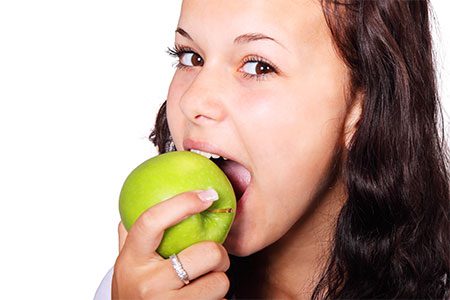You know eating healthy foods is good for weight loss and your overall health, but did you know it is also important for your oral health? The foods we eat can have an effect on the health of our mouths and teeth.
There is a direct relationship between our diet and our oral health, and the explanation can be summed up fairly easily: eating the same healthy foods that are good for our physical body are also good for our oral health.

Cavities
One the most common oral health problems caused by diet are cavities in teeth. According to the Mayo Clinic, “cavities, also called tooth decay or caries, are caused by a combination of factors including bacteria in your mouth, frequent snacking, sipping sugary drinks, and not cleaning your teeth well.”
Sugars and carbohydrates from foods combine with bacteria and convert to acid in your mouth. This acid eats away at your tooth enamel, the hard covering on your teeth, causing holes or cavities in your teeth.
These cavities not only cause problems such as bad breath, but also serious oral health issues including tooth decay. Eating foods high in calcium and phosphorus helps to re-mineralize or fill in any holes that may occur in your tooth enamel.
Foods for Oral Health
Foods that include calcium and phosphorus for strong teeth and healthy gums include milk, cheese, nuts, and meat. Green vegetables such as broccoli and spinach are also high in calcium for individuals that cannot ingest milk products, also known as lactose intolerance.
Other foods beneficial to your oral health include firm and crunchy fruits and vegetables, such as apples, pears, and carrots. Eating these types of foods creates more saliva, which helps wash away food particles out of the crevices in your teeth, gums, and tongue.
Fruits and vegetables are also high in water content. The water content helps dilute any sugars, that, when combined with the bacteria in your mouth, can turn into acid that can damage your teeth.
Acidic and Sugary Foods
Foods that are highly acidic can cause cavities and other oral health issues such as canker sores. Highly acidic foods include tomatoes, and citrus fruits such as oranges, grapefruit, and lemons.
There are many common foods that contain sugar and carbohydrates. When eaten, the carbohydrates in foods break down into sugars. Just like regular sugars, when carbohydrates combine with the bacteria in your mouth they can become acidic.
Common foods high in carbohydrates include breads, bagels, potato chips, and even French fries. Foods high in sugar include cookies, cakes, pies, and candy.
Raisins and other dried fruit, although somewhat of a health food, can also contain high amounts of sugar. Dried fruits tend to be sticky and can adhere to your teeth. You should be mindful of the issues they can cause in your mouth when eating these types of foods.
Drinks
The same rules apply for drinks as they do for foods when it comes to oral health. Drinks that are low in sugar, carbohydrates, and are non-acidic are the best types.
Water with fluoride is the optimum in drinks for oral health. The water flushes food particles from between teeth and out of crevices. It also hydrates your mouth, creating plenty of saliva to neutralize acids and bacteria. The fluoride helps to rebuild any soft spots in your tooth enamel.
Other good drink choices include milk, which is high in calcium to strengthen teeth, and unsweetened teas.
Although a favorite summer-time drink, Lemonade is acidic and often contains sugar. Sodas are another drink that are highly acidic and may be loaded with sugars. Other drinks to be careful of include coffee and teas with added sugar, hot chocolate, and flavored drink mixes.
Dentists
Professional dental offices such as Kirkland Family Dentistry in Kirkland Washington, are the best sources of information about what foods are best for the health of your teeth and gums
After a thorough examination, your dentist can assess the overall health of your mouth and suggest modifications that could be made in the foods you eat to help any issues or concerns.
Schedule an appointment today and let the professionals at Kirkland Family Dentistry assess the needs of you and your family. They can explain the relationship between you and your family’s diet and your oral health.

